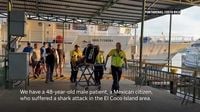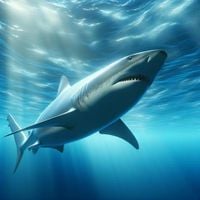On Saturday, September 27, 2025, a dramatic and harrowing event unfolded off the Pacific coast of Costa Rica, near the legendary Cocos Island National Park. Mauricio Hoyos, a 48-year-old Mexican marine biologist with decades of experience in shark research, was attacked by a shark while conducting a scientific dive. Despite sustaining serious injuries to his head, face, and arms, Hoyos survived the ordeal and was reported to be in stable condition after a grueling rescue operation and transfer to a hospital in Costa Rica’s capital, San José.
According to The Associated Press, Hoyos was engaged in a routine but critical task: tagging sharks for monitoring as part of a scientific expedition. The dive was conducted under the auspices of the One Ocean Worldwide Coalition, a collaborative initiative that brings together several conservation organizations, including Fins Attached, For the Oceans Foundation, Reserva Tortuga, and the Rob Stewart Sharkwater Foundation. These groups are united in their mission to study and protect marine life, with a particular focus on the sharks that make Cocos Island one of the world’s premier diving destinations.
Cocos Island National Park, designated a UNESCO World Heritage Site in 1997, sits about 340 miles (550 kilometers) off Costa Rica’s coast. It is celebrated for its astonishing biodiversity, especially its thriving shark populations. The waters surrounding the island are home to at least 14 species of sharks, including whale sharks, hammerhead sharks, and tiger sharks, making it a magnet for marine biologists and adventure-seeking divers alike.
The events of that Saturday unfolded rapidly. As Hoyos was tagging one of the island’s shark species for research, the animal suddenly turned. Luis Fernández, a physician with Costa Rica’s Fire Department, explained the situation in stark terms: “He was tagging species for monitoring and when he tagged one of the island’s shark species, the shark turned. It was about 4 meters long with an enormous bite force — it turned and bit him on the head.” The bite caused significant trauma, but quick action by the research team and emergency responders proved crucial.
The Costa Rican Fire Department mounted a rescue operation that was as complex as it was urgent. Hoyos was stabilized at the scene and then transported on a 36-hour journey from the remote Cocos Island to the mainland. The trip covered rough seas and considerable distance, all while medical personnel worked tirelessly to ensure that Hoyos remained stable. He arrived at the hospital in San José on Monday, September 29, 2025, where he was reported to be in stable condition despite the severity of his injuries.
News of the attack sent ripples through the global marine science and conservation communities. Dr. Alex Antoniou, executive director of Fins Attached, expressed both relief and admiration for Hoyos and those who aided him. “Incidents like this are extremely rare,” Antoniou stated on social media. “Dr. Hoyos is an extraordinary scientist who has dedicated his career to shark conservation, and we are deeply grateful for the support of the Cocos Island community in this very difficult time.”
Hoyos’s work is emblematic of the risks faced by marine scientists who venture into the world’s wildest waters to protect vulnerable species. Tagging sharks is a vital part of conservation science, allowing researchers to track migration patterns, population health, and the impact of environmental changes. However, as this incident makes clear, even the most seasoned professionals can encounter danger in the field.
Despite the drama and danger, experts and authorities have been quick to emphasize the rarity of such attacks. According to The Associated Press, Cocos Island has been the site of only a handful of shark incidents, and the last comparable attack occurred in 2017, when a female tiger shark mauled a diver near the island. At that time, local authorities noted it was the first attack of its kind in the park’s history. The overwhelming majority of shark encounters in the region are peaceful, and the animals themselves are typically wary of humans.
For conservationists, the presence of so many shark species around Cocos Island is a point of pride—and a reminder of the importance of continued research and protection. The area’s rich marine life is a major draw for eco-tourism, and the island’s World Heritage status underlines its global ecological significance. According to Costa Rica’s Ministry of Environment and Energy, the diversity of sharks—including the majestic whale shark, the iconic hammerhead, and the formidable tiger shark—makes Cocos Island a living laboratory for scientists and a beacon for those who hope to preserve the world’s oceans for future generations.
Hoyos’s ordeal has also brought renewed attention to the collaborative efforts of the One Ocean Worldwide Coalition. The coalition’s work spans scientific research, education, and advocacy, with the goal of ensuring healthy oceans for both wildlife and people. The organizations involved have rallied around Hoyos, offering support and reiterating the importance of their shared mission. As Dr. Antoniou put it, “We are deeply grateful for the support of the Cocos Island community in this very difficult time.”
As the marine biologist recovers, colleagues and supporters are reflecting on both the risks and the rewards of conservation work. The incident has sparked conversations about safety protocols, emergency preparedness, and the need for ongoing investment in both research and rescue infrastructure. At the same time, Hoyos’s survival is being celebrated as a testament to the resilience of both the human spirit and the scientific community.
Cocos Island remains, as ever, a place of awe and mystery—its waters teeming with life, its reefs a testament to nature’s grandeur, and its researchers undaunted in the face of adversity. For Mauricio Hoyos, the journey to recovery is just beginning, but his commitment to shark conservation appears as strong as ever. The world will be watching as he, and the scientific community he represents, continue the vital work of understanding and protecting the ocean’s most enigmatic creatures.


